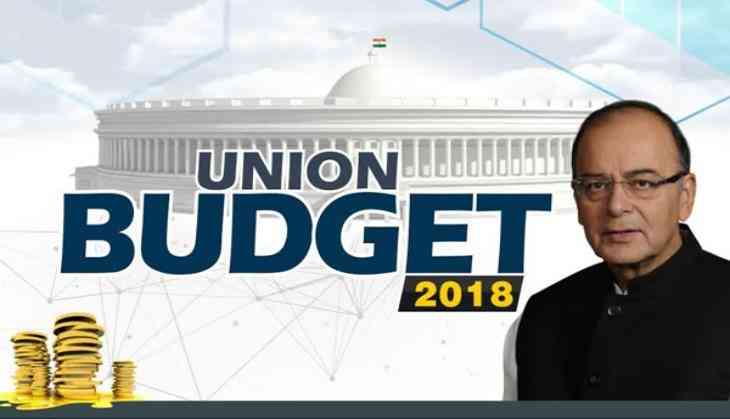
Finance Minister Arun Jaitley on Thursday, while announcing Union Budget 2018-19 in Parliament, said Prime Minister Narendra Modi has given a clarion call to double farmers' income by 2022 when India celebrates its 75th year of Independence.
"Our emphasis is on generating higher incomes for farmers. We consider agriculture as an enterprise and want to help farmers produce more from the same land parcel at lesser cost and simultaneously realize higher prices for their produce," the Minister said while announcing a slew of new initiatives for the farm sector in Budget 2018-19.
Jaitley also announced that the government has decided to keep Minimum Support Price (MSP) for all hitherto unannounced crops of Kharif at least at one and half times of their production cost.
"This historic decision would prove an important step towards doubling the income of our farmers and NITI Aayog in consultation with central and state governments will put in place a fool proof mechanism so that farmers will get adequate price for their produce," Jaitley said.
As a primary measure, the government announced raising institutional credit for agriculture sector to Rs.11 lakh crore for the year 2018-19 from Rs.10 lakh crore in 2017-18.
Taking government's vision ahead, the Finance Minister announced the launching of 'Operation Greens' to address price volatility of perishable commodities like potatoes, tomatoes and onions, at an outlay of Rs. 500 crore.
'Operation Greens', on the lines of 'Operation Flood', shall promote Farmer Producers Organizations (FPOs), agri-logistics, processing facilities and professional management in the sector.
The Finance Minister further announced 100 percent deduction in respect of profits to Farmer Producer Companies (FPCs), having turnover upto Rs. 100 crore, for a period of five years from FY 2018-19, in order to encourage professionalism in post harvest value addition in agriculture.
Organic farming by Farmer Producer Organizations (FPOs) and Village Producers' Organizations (VPOs) in large clusters, preferably of 1000 hectares each, will be encouraged.
Women Self Help Groups (SHGs) will also be encouraged to take up organic agriculture in clusters under National Rural Livelihood Programme.
A sum of Rs. 200 crore have been allocated to support organized cultivation of highly specialized medicinal and aromatic plants and aid small and cottage industries that manufacture perfumes, essential oils and other associated products.
Announcing the development and upgradation of existing 22,000 rural haats into Gramin Agricultural Markets (GrAMs), the Finance Minister said that more than 86 percent of farmers in India are small and marginal who are not always in a position to directly transact at APMCs and other wholesale markets.
In these GrAMs, physical infrastructure will be strengthened using MGNREGA and other government schemes and would be electronically linked to e-NAM and exempted from regulations of APMCs.
This would provide farmers facility to make direct sale to consumers and bulk purchasers.
In Budget 2017, the government had announced strengthening of e-NAM and to expand coverage of e-NAM to 585 APMCs.
Out of that, 470 APMCs have been connected to e-NAM network and rest will be connected by March, 2018, Jaitley revealed.
Further, an Agri-Market Infrastructure Fund with a corpus of Rs. 2000 crore will be set up for developing and upgrading agricultural marketing infrastructure in the 22000 Grameen Agricultural Markets (GrAMs) and 585 APMCs.
Announcing doubling of allocation for Ministry of Food Processing from Rs.715 crore in RE 2017-18 to Rs.1400 crore in BE 2018-19, Jaitley said that the Prime Minister Krishi Sampada Yojana is the flagship programme for boosting investment in food processing and the sector is growing at an average rate of eight percent per annum.
With the increased allocation for the sector, the government will promote establishment of specialized agro-processing financial institutions in this sector and to set up state-of-the-art testing facilities in all the forty two Mega Food Parks.
Announcing a major step to help small and marginal farmers in fisheries and animal husbandry sector to meet their working capital needs, the Finance Minister also extended the facility of Kisan Credit Cards (KCC) to the sector.
This would give benefit of crop loan and interest subvention, so far available to agriculture sector only under KCC, for rearing of cattle, buffalo, goat, sheep poultry and fisheries.
Further, a Fisheries and Aquaculture Infrastructure Development Fund (FAIDF) for fisheries sector and an Animal Husbandry Infrastructure Development Fund (AHIDF) for financing infrastructure requirement of animal husbandry sector, will be alloted.
The total corpus of these two new funds would be Rs.10,000 crore.
With a focus on linking bamboo growers with consumers; creation of facilities for collection, aggregation, processing, marketing, MSMEs, skill building and brand building; Jaitley announced the launch of the Rs.1290-crore Re-structured National Bamboo Mission.
This would contribute in generating additional income for farmers, employment opportunities for skilled and unskilled youth especially in rural areas.
--ANI


